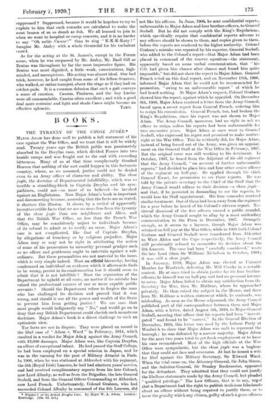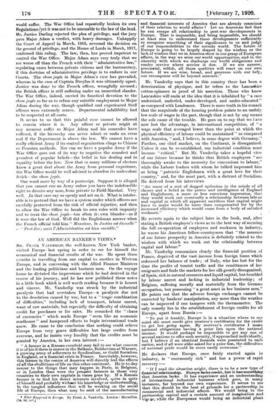BOOKS.
THE TYRANNY OF THE CHOSE JUGEE.• IsfAaoR ADAM has done well to publish a full statement of his case against the War Office, and we trust that it will be widely read. Twenty years ago the British public was passionately absorbed in the Dreyfus case, which divided France into two hostile camps and was fought out to the end with exceeding bitterness. Many of us at that time complacently thanked Heaven that nothing of the sort could happen in this fortunate country, where, as we assumed, justice could not be denied even to an Army officer of character and ability. The chose jugee, the doctrine of Departmental infallibility, which was so terrible a stumbling-block to Captain Dreyfus and his sym- pathizers, could not—so most of us believed—be invoked against an Englishman. Now Major Adam's book is important and disconcerting because, assuming that the facts are as stated, it shatters this illusion. It shows by a recital of apparently incontrovertible facts that we are no more free from the tyranny of the chose jug& than our neighbours and Allies, and that the British War Office, no less than the French War Office, may be scandalously unjust to individuals because of its refusal to admit or to rectify an error. Major Adam's case is not complicated, like that of Captain Dreyfus, by allegations of treachery or by religious prejudice. Major Adam may or may not be right in attributing the action of some of his persecutors to unworthy personal grudges such as no officer and gentleman ought to entertain against a sub- ordinate. But these personalities are not material to the issue, which is very simple indeed. Must an official hierarchy, having condemned an individual on evidence which it afterwards finds to be wrong, persist in its condemnation lest it should seem to admit that it is not infallible ? Must the reputation of the Department be upheld at all costs, no matter if its mistake has ruined the professional careers of one or more capable public servants ? Should the Department refuse to forgive the man who has challenged its decision and proved that it was wrong, and should it use all the power and wealth of the State to prevent him from getting justice ? We are sure that most people would indignantly say " No," and would go on to deny that any British Department could cherish such monstrous doctrines. Major Adam's book is a direct challenge to such an optimistic view.
The facts are not in dispute. They were placed on record in the libel case of " Adam v. Ward " in February, 1914, which resulted in a verdict for Major Ada against the Army Council, with £2,000 damages. Major Adam was, like Captain Dreyfus, an officer of exceptional talent. He had passed the Staff College, he had been employed on a special mission in Japan, and he was in the running for the post of Military Attache in Paris. In 1906, when he was stationed at Aldershot with his regiment, the 5th (Royal Irish) Lancers, he had had nineteen years' service, and had received complimentary reports from his late Colonel, now Lord Allenby, as well as from the Brigadier, the late General Scobell, and from the General Officer Commanding at Aldershot, now Lord French. Unfortunately, Colonel Graham, who had succeeded Colonel Allenby in command of the 5th Lancers, did
• IV/taker? or the British Dreyfus Case, By Major W. A. Adam. London : Boutledge. flOa. 6d. net.j
not like his officers. In June, 1906, he sent confidential reports, unfavourable to Major Adam and four brother-officers, to General Scobell. But he did not comply with the King's Regulations, which specifically require that confidential reports adverse to any officers should be shown to them, and copies given to them, before the reports are rendered to the higher authority. Colonel Graham's mistake was repeated by his superior, General Soobell, who added to the Colonel's report—that Major Adam had been placed in command of the reserve squadron—the statement, apparently based on some verbal communication, that " his C.O. had given him chance after chance and found him quite impossible," but did not show the report to Major Adam. General French acted on this dual report, and on November 11th, 1906, informed Major Adam that he could not be recommended for promotion, " owing to an unfavourable report " of which he had heard nothing. At Major Adam's request, Colonel Graham showed him the report, against which he appealed. On December 9th, 1906, Major Adam received a letter from the Army Council, based upon a secret report from General French, ordering him to resign his conunission. General French, too, had broken the King's Regulations, since his report was not shown to Major Adam. The Army Council, moreover, had no right to ask officer to resign unless his reports had been unfavourable for two successive years. Major Adam at once went to General Scobell, who expressed his regret and promised to make matters right at the War Office. This he evidently did, for Major Adam, instead of being forced out of the Army, was given an appoint- ment on the General Staff at the War Office in February, 1907. But the original error was still working to his detriment. In October, 1907, he heard from the Adjutant of his old regiment. 'that the Army Council, " on account of further unfavourable reports," had decided to place him and four other senior officers of the regiment on half-pay. He applied through his chief, General Ewart, for permission to see these reports. He was told by the private secretary to the Chief of the Staff that the Army Council would adhere to their decision—a chose jugee- and that, if he persisted in demanding to see the reports, he would lose his Staff appointment. His four comrades received similar treatment. One of them had been away from the regiment for a year before he heard of his Colonel's adverse report. Tae virtual dismissal of the five officers caused a public scandal, which the Army Council sought to allay by a most misleading communication to the Press in December, 1907. Strangely enough, as it seems to a layman, though Major Adam was retained on full pay at the War Office, while in 1908 both Colonel Graham and General Scobell were transferred from Aldershot to West Africa and the Cape respectively, the Army Council still persistently refused to reconsider its decision about the 5th Lancers. The case had been " carefully considered," wrote the late Lord (then Sir 'William) Nicholson in October, 1909 ; it was still a chose jugde.
In January, 1910, Major Adam was elected as Unionist Member for Woolwich, defeating Mr. Will Crooks in a notable contest. He at once tried to obtain justice for his four brother- officers; he himself was on half-pay and had no personal interest to serve. Major Adam failed to obtain any satisfaction from the Secretary for War, then Mr. Haldane, whom he approached privately. He then raised the subject in the House, and drew from Mr. Haldane a written statement which, he contends, was misleading. As soon as the House adjourned, the Army Council published part of the correspondence between them and Major Adam, with a letter, dated August 5th, 1910, to Major-General Scobell, assuring that officer that his reports had been " investi- gated " and found to be " correct." In the General Election of December, 1910, this letter was used by the Labour Party at Woolwich to show that Major Adam was unfit to represent the
borough ; he was defeated by a narrow majority. Major Adam for the next two years tried to get fresh employment or to have his case reconsidered. Most of the high officials at the War Office were sympathetic, but the dam jugde was a bugbear that they could not face and overcome. At last he. issued a writ for libel against the Military Secretary, Sir Edward Ward. When the trial came on, the Attorney-General, Sir John Simon, and the Solicitor-General, Sir Stanley Buokmaster, appeared for the defendant. They admitted that they could not justify the libelous statements made by the Army Council, but pleaded " qualified privilege." The Law Officers, that is to say, urged that a Department had the right to publish malicious falsehoods about an officer without being required to justify them, or to incur the penalty which any citizen, guilty of such a gross offence.
would suffer. The War Office had repeatedly broken its own Regulations ;'yet it was not to be amenable to the law of the land. Mr. Justice Darling rejected the plea of privilege, and the jury gave Major Adam a verdict, with heavy damages. Unhappily the Court of Appeal in March, 1915, reversed the decision on the ground of privilege, and the House of Lords in March, 1917, confirmed this ruling. The law, then, has proved impotent to control the War Office. Major Adam says very truly that we are worse off than the French with their " administrative law," regulating cases between-private citizens and the bureaucracy, if this doctrine of administrative privilege is to endure in our Courts. The chose judge in Major Adam's case has prevailed, whereas in the case of Captain Dreyfus it was ultimately upset. Justice was done to the French officer, wrongfully accused ; the British officer is still suffering under an unmerited slander. The War Office, indeed, carried its fanatical devotion to the chose judge so far as to refuse any suitable employment to Major Adam during the war, though qualified and experienced Staff officers were extremely scarce. Departmental infallibility had to be respected at all costs.
It seems to us that this painful case cannot be allowed to remain where it is. Any officer or private might at any moment suffer as Major Adam and his comrades have suffered, if the hierarchy can never admit or undo an error and if the Department is above the law. We cannot have a really efficient Army if its central organization clings to Chinese or Prussian methods. Nor can we have a popular Army if the War Office goes out of its way to negative the soundest and proudest of popular beliefs—the belief in fair dealing and in equality before the law. Now that so many millions of electors know a great deal about the Army from personal experience, the War Office would be well advised to abandon its malevolent fetish—the chose jugee.
One word more by way of a postscript. Suppose it is alleged that you cannot run an Army unless you have the indefeasible right to dismiss any man, from private to Field-Marshal. Very Jn that case say so openly and act on it. What is intoler- able is to pretend that we have a system under which officers are carefully protected from the risk of official injustice, and then to allow the War Office to break its own rules with impunity and to treat the chose judge—too often it3 own blunder—as if it were the law of God. Well did the Englishman answer when • the French official told him " Monsieur, is Justice est &melte" Peut-41re: Incas Adnzinistration est bien variable."







































 Previous page
Previous page